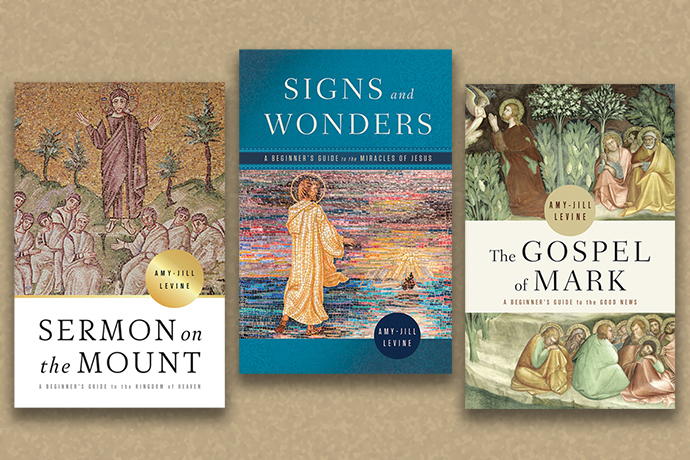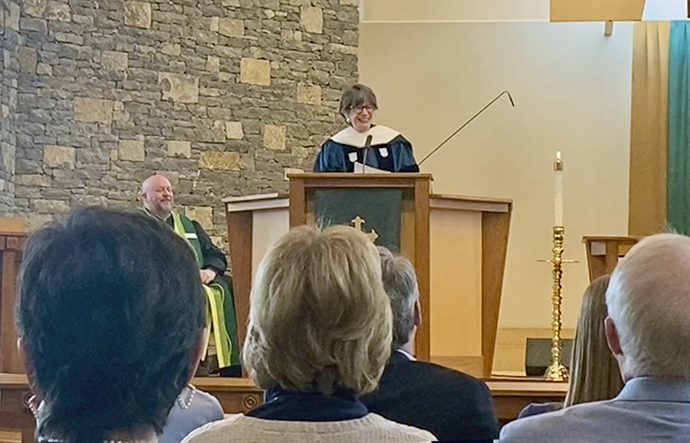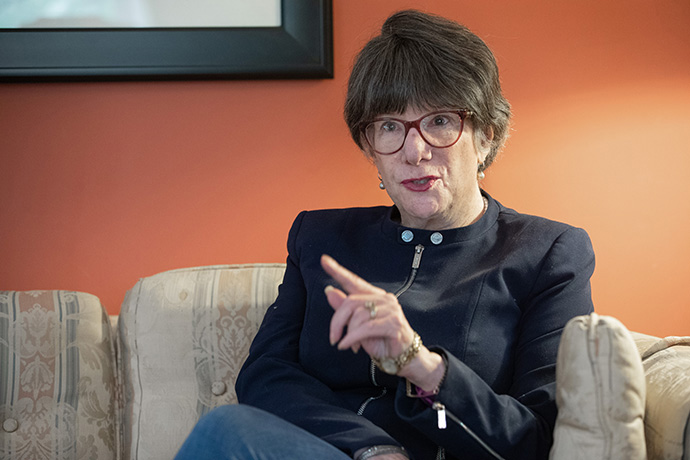Key Points
- Amy-Jill Levine is a Jewish scholar of the New Testament who taught for many years at Vanderbilt University.
- She’s done a series of concise, accessible books and videos about the New Testament for Abingdon Press, an imprint of The United Methodist Publishing House.
- Her materials have been a hit with United Methodist and other mainline Protestant churches, leading to many speaking invitations for Levine.
Amy-Jill Levine spoke on the Good Samaritan story one Sunday recently at Christ United Methodist Church in Franklin, Tennessee. In the pews sat Elizabeth Wanczak, a 37-year-old lifelong United Methodist who knew the subject well.
Or so she thought.
Levine shared how Jesus’ Jewish audience would have understood the parable. Suddenly Wanczak heard it afresh. The force of the command “love your neighbor as yourself” — and Jesus’ broad understanding of “neighbor,” extending to blood enemies — hit her as never before.
“I was blown away,” she said of Levine’s message. “I was moved to tears, truthfully.”
Lots of people are having an Amy-Jill Levine experience these days. Through her books, videos and visits to churches — both in person and via Zoom — she has become one of the most popular Bible teachers for The United Methodist Church and other mainline Protestant denominations.
Levine, 67, is not a United Methodist or Christian of any stripe. She belongs to an Orthodox synagogue in her home city of Nashville. She describes herself as completely fulfilled in her Jewish identity.
But Levine also is a renowned scholar of the New Testament, one who taught for nearly three decades at Vanderbilt University and its Divinity School, earning election to the American Academy of Arts and Sciences.
A few years ago, Levine began writing a “Beginner’s Guide” series for The United Methodist Publishing House, under its Abingdon Press imprint.
Levine’s books and accompanying instructional videos are aimed at laity in Sunday school classes and other small groups. They cover such subjects as Advent, Holy Week and the Sermon on the Mount. One is titled “The Difficult Words of Jesus: a Beginner’s Guide to His Most Perplexing Teachings.”

The books and videos are concise, lively, leavened with humor. They seek to deepen Christians’ understanding of the Jewishness of Jesus and the culture from which the New Testament emerged.
“What I can do in my publications is to say, ‘You think you understand the New Testament. You’ve read it a lot. Now, if I fill in some historical background, you will be able to see what’s familiar to you but in a richer context. You will be able to get a deeper meaning out of it,’” Levine told United Methodist News during an interview in her Nashville home.
Three of Levine’s Abingdon Press books currently rank among the top 15 bestsellers in Amazon’s Adult Christian Education category.
Considering various outlets, Levine’s Abingdon Press books have sold more than 200,000 copies, said the Rev. Brian Milford, top executive of The United Methodist Publishing House.
He and his staff estimate that well over 15,000 small groups, in thousands of United Methodist congregations, have studied her Abingdon Press materials.
“In both the number of copies sold and the praise of students and teachers, it is apparent that Dr. Levine’s work ignites enthusiastic Bible study that begins with a clear-eyed view of the settings and people of the New Testament and the life and teachings of Jesus,” Milford said.
The books and videos have boosted the number of speaking invitations Levine gets.
“I’m in Methodist churches a lot, and they have welcomed me,” Levine said.
One is Myers Park United Methodist Church in Charlotte, North Carolina, where she’s been a repeat guest and her books have been studied.
“She’s made the adaptation to be able to speak to lay people,” said the Rev. James Howell, senior pastor. “They learn a lot. They’re moved. They’re humored.”
On page and in person, Levine is a presence.
She insists people call her “AJ.” She lectures, even preaches, barefoot — a practice she began as a young, pregnant professor with swollen feet.
Levine learned knitting at her mother’s knee and still knits daily. She would take knitting needles to Vanderbilt faculty meetings, completing a line of a sweater as others droned on.
When she finally put her needles down and spoke, she recalls, she had the room’s attention.

Levine is deeply serious about a lot of things, including fighting the antisemitism that creeps into Christian teaching when Judaism is depicted as legalistic and lacking in grace — when it becomes a “negative foil,” she says, against the teachings of Jesus and Paul.
But she’s doesn’t go long in her books or speaking engagements without a quip.
Levine met in December by Zoom with members of Isle of Hope United Methodist Church, in Savannah, Georgia, and her humor came through as she discussed the Magi’s appearance in the Gospel of Matthew.
“I talk to Matthew all the time,” Levine said, smiling big. “I did my dissertation on Matthew. I’ve been talking to him for ages.”
Levine grew up in the coastal town of North Dartmouth, Massachusetts, an only and longed-for child, born when her mother was 44.
The community was predominantly Portuguese Catholic. Levine’s parents took her to synagogue and sent her to Hebrew school but also taught her that Judaism and Christianity had Scripture in common, and that Jesus and Mary were Jews who meant a lot to Christians. She was allowed to go with friends to Mass and help them trim their Christmas trees.
Subscribe to our
e-newsletter
As Levine has shared often, she was in second grade when a classmate told her, “You killed our Lord,” reflecting the antisemitic teaching of a local priest. Levine went home crying. Her mother assured her the little girl was mistaken and complained to the diocese.
Levine not only got through the trauma but also soon began her life’s work of studying the New Testament.
“As I learned more about Christian origins, I came to realize that these accounts are also part of Jewish history, and I learned that the New Testament can be understood and appreciated without investing a toxic Judaism to explain the appeal of Jesus and Paul,” she said.
Levine went to Smith College, where she majored in English and religion, minoring in history and classics. For graduate school, she chose Duke University and its Divinity School, in part because the faculty included W.D. Davies, an expert on the New Testament’s Jewish context.
Duke Divinity is a United Methodist seminary, and Levine made United Methodist friends there. Two of those, the Rev. Priscilla Pope-Levison and Jack Levison, teach now at Southern Methodist University’s Perkins School of Theology.
“Funny, smart, outspoken, not afraid” is how Pope-Levison describes Levine from their Duke days.
Levine taught first at Swarthmore College, then she and her husband, Jay Geller, a Jewish studies professor, joined the Vanderbilt faculty.
It’s hard to summarize or overstate Levine’s scholarly accomplishments. Her curriculum vitae — listing her teaching, writing and public speaking — exceeds 90 pages. She’s written books for a range of publishers and co-edited, for Oxford University Press, “The Jewish Annotated New Testament.”
The Teaching Company chose her to do “Great Courses” videos on the Old Testament and on leading figures of the New Testament. She has lectured worldwide, becoming the first Jewish person to teach New Testament at Rome’s Pontifical Biblical Institute.
Three times, she’s had audiences with Pope Francis.
“First time, thrilling. Second time, thrilling. Third time, still thrilling,” Levine said.

Levine’s United Methodist connections deepened during her nearly 30 years at Vanderbilt. Among the first churches to invite her to speak was West End United Methodist, near Vanderbilt.
Many of her divinity school students have become United Methodist pastors, and she recalls being deeply moved by an ordination service for some of them at Brentwood United Methodist Church, near Nashville.
“The sense of vocation, commission and support was palpable,” she said.
A few years back, Levine joined the Rev. Ben Witherington III in writing a commentary on the Gospel of Luke for Cambridge University Press. Witherington, a retired United Methodist pastor and longtime professor at Asbury Theological Seminary, notes that theirs was the first Gospel commentary written by a Christian scholar and Jewish scholar.
Levine remembers their collaboration fondly.
“Ben and I have strong disagreements about much in biblical studies, but we agree on what is ultimately important, whether Leviticus 19:18 or Deuteronomy 6:5 or the Boston Red Sox,” she said.
Levine wrote her first Abingdon Press book, “The New Testament: Methodist and Meanings,” with Warren Carter, who teaches at Phillips Theological Seminary. That book came out in 2013.
The Beginner’s Guide series that has proved so popular with mainline Protestant churches began a few years later and owes to Levine’s friendship with Maria Mayo, acquisitions editor at Abingdon Press.
Mayo had been a doctoral student under Levine at Vanderbilt. They worked together on an Abingdon Press study guide for Levine’s book “Short Stories by Jesus,” which had been published by HarperOne.
The study guide’s success led to Levine writing, and Mayo editing, “Entering the Passion of Jesus: a Beginner’s Guide to Holy Week.” Six books have followed, the most recent being “The Gospel of Mark: a Beginner’s Guide to the Good News.”
About having Mayo as editor, Levine said: “It’s very odd to be told what to do by your former graduate student. I had spent years saying, ‘Look, when you put your dissertation together, this goes here and that goes there, and this is too wordy.’ And now she’s doing exactly the same thing to me, with the training I gave her. And she’s spot on every time.”
Mac Pirkle has overseen the production of videos supporting Levine’s Abingdon Press books, taking her to various taping locations, including a courtroom, a jewelry store and the Nashville Zoo.
“She was game for all of it,” Pirkle said.
But taping at the zoo in winter, in a barn with sheep, tested her.
“Sheep, God bless them — they smell,” she said. “I thought between the sheep and the cold I was going to pass out.”
The Beginners Guides are not “Dummies” books. Levine draws on her knowledge of Hebrew, Greek and Aramaic, as well as Jewish history and rabbinic tradition. She carefully shows that many New Testament verses echo others from Deuteronomy, Isaiah, Jeremiah, the Psalms.
Reading Levine, Christians acquire a more nuanced understanding of the Pharisees — and find a new take on familiar parables.
“Parables are not videotapes of life: they are stories designed to challenge us, to provoke us, to get us to think and to motivate us to act morally,” Levine writes in “The Difficult Words of Jesus.”
Among Levine’s biggest United Methodist fans is the Rev. Dawn Taylor-Storm. She helped organize a four-week study of Levine’s works in the Eastern Pennsylvania Conference.
“We live in a time of so much division, and often religion has been part of the separation of people,” Taylor-Storm said. “In her writing, AJ lifts up the ways people of faith, particularly Jews and Christians, can learn from each other.”
Levine retired from Vanderbilt in 2021, but her work ethic didn’t get the memo. She’s often on the road, speaking or attending conferences. She has projects going with various publishers. She’s even co-written a series of children’s books.
Her next Beginner’s Guide, on the Gospel of John, is due out later this year, and she’s under contract for one on the Book of Genesis.
“I would like this series to continue, because I like working with Abingdon and I like working with Maria,” she said.
As her schedule permits, Levine plans to keep speaking to United Methodists and other church groups.
She already has a computer folder full of emails from grateful readers and audience members.
“When I’m having one of those days that’s really not going well, I just pull up the ‘Nice Notes’ folder and look at a couple of those. Then I’m good.”
Hodges is a Dallas-based writer for United Methodist News. Contact him at 615-742-5470 or newsdesk@umcom.org. To read more United Methodist news, subscribe to the free Daily or Weekly Digests.




